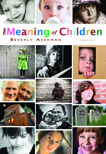The cover of Beverly Akerman’s first collection of short stories, The Meaning of Children, features an engaging collage of photographs under the rainbow-hued title. Charming cherubic faces smile out at the passing potential reader, suggesting that the stories behind the cover will most certainly be heart-warming vignettes celebrating the innumerable gifts that children bring to our lives.
In fact, what the fourteen stories in Akerman’s collection do is describe the myriad ways that mothering and marriage can damage and destroy a woman’s soul and spirit. The first three stories, all set in the 1960s and told in the first person, introduce the reader to the mother as a resentful victim of her maternal state. The narrators are all young girls who observe and absorb everything, precocious and articulate beings who are confused and distressed by their mothers’ turmoil and who crave a level of emotional intimacy that their mothers are incapable of giving them. The mothers are women who blame their daughters for turning their once luxurious hair to straw, who start each morning with a nagging session, who, over the family dinner table and in front of the children, tell their husband, “Maybe I should’ve had you fixed.”

The Meaning Of Children
Beverly Akerman
Exile Editions
$19.95
paper
232pp
9781550961485
In “Lighter Than Air,” Sandra is the mother of an immature twenty-two-year-old son whom she still drives to the therapist, and the wife of a successful businessman who is often out of town. She has compromised all her dreams for her family and in her mid-forties is left empty and bitter. The story tracks the disintegration of her life. Her son finds a girlfriend and gives up on the therapy. Her husband, fed up with Sandra’s nagging and unavailability in bed, hooks up with a lover in China, and Sandra’s work loses its meaning. Sandra, now unwanted and unloved by the men in her life, spirals down into despair and attempts suicide.
The final section of the collection features stories about the senior set. In “Academic Freedom” and “Carbon Dated, Gold-Plated,” Akerman describes a deadly soul-sucking variety of marriage. The wives in these stories are victims, trapped by unions that they waited too long to leave. Their long-buried secrets and unrealized dreams taunt and torment them and in the end injury and illness seal their fates. They will never be free.
Exploring the dark side of the maternal and matrimonial experience is both relevant and valuable, and Akerman is to be commended for her choice of subject matter. But by populating her tales with bitter, resentful, powerless, and almost uniformly unhappy female characters, the author catalogues the weaknesses of women while largely failing to celebrate their courage and strength. Redemption is unattainable for almost all of the wives and mothers in The Meaning of Children. Without a chance for recovery or rescue, we are left with the strong suspicion that the meaning of a woman’s life is limited to servitude and despair. mRb






0 Comments